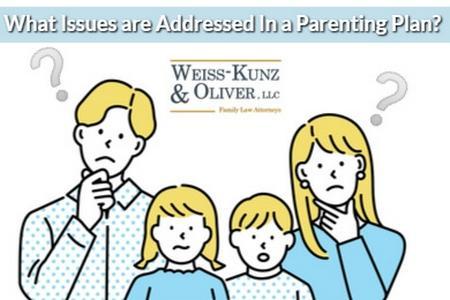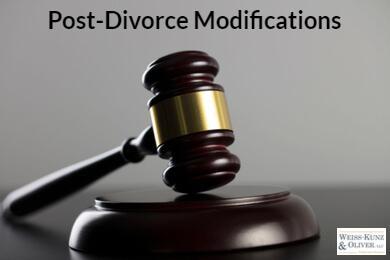116 N. York Street, 3rd Floor, Elmhurst, IL 60126
 312-605-4041
312-605-4041
Recent Blog Posts
When Will a Divorce Involve a Guardian Ad Litem or Child Custody Evaluator?
 Even at the best of times, a divorce is likely to involve conflict between spouses. While a couple may be able to negotiate with each other and come to agreements in some areas, they may reach an impasse when addressing certain issues. In many cases, disagreements involving a couple's children can be especially difficult to resolve. To address these matters, outside experts may become involved in a case, and a judge may appoint a guardian ad litem or child custody evaluator. When dealing with these types of experts, parents will need to make sure to understand their rights and the ways they can protect their children's best interests.
Even at the best of times, a divorce is likely to involve conflict between spouses. While a couple may be able to negotiate with each other and come to agreements in some areas, they may reach an impasse when addressing certain issues. In many cases, disagreements involving a couple's children can be especially difficult to resolve. To address these matters, outside experts may become involved in a case, and a judge may appoint a guardian ad litem or child custody evaluator. When dealing with these types of experts, parents will need to make sure to understand their rights and the ways they can protect their children's best interests.
The attorneys of Weiss-Kunz & Oliver, LLC have represented clients in a wide variety of complex divorce and family law cases involving child-related issues. With our experience in these matters, which includes serving as guardians ad litem and legal representatives for children, we can help divorcing parents understand the best ways to proceed in these matters. We work to help our clients resolve disputes related to their children and other aspects of divorce as effectively as possible, ensuring that they will be able to move forward with their lives and maintain positive family relationships after completing the divorce process.
Illinois Appeals Case Addresses Postnuptial Agreements and Unconscionability
 Cases involving family law issues can be very complicated, and there are some situations where the decisions made in family court may be challenged by one of the parties involved. During an appeal, a person may argue that errors were made during the original case and that the decisions were based on an incorrect interpretation of the law. Appeals are usually only needed in extraordinary circumstances, but they may be necessary to ensure that a person is treated fairly.
Cases involving family law issues can be very complicated, and there are some situations where the decisions made in family court may be challenged by one of the parties involved. During an appeal, a person may argue that errors were made during the original case and that the decisions were based on an incorrect interpretation of the law. Appeals are usually only needed in extraordinary circumstances, but they may be necessary to ensure that a person is treated fairly.
Not all appeals are successful, and unfortunately, appellate court judges sometimes make decisions that may be viewed as unfair and unjust by those who were involved in a case. Attorney Amanda Oliver recently represented a client in an appeal involving the enforceability of a postnuptial agreement, and while the court ruled against her client, the case illustrates some of the issues that may be addressed when these types of matters are contested. The case in question involved a high net worth divorce, in which the wife wished to leave a marriage with a husband that she claimed was emotionally abusive. The husband convinced the wife to sign a one-sided postnuptial agreement, and after the wife filed for divorce, the husband took action to enforce this agreement. The wife argued that the agreement should not be enforceable because it was unconscionable, or grossly unfair. However, the trial court ruled against the wife and upheld the terms of the agreement.
How Will Infidelity Affect an Illinois Divorce?
 There are many reasons why a couple may choose to end their marriage, but infidelity is one of the most common causes of the breakdown of a relationship. When one spouse engages in an extramarital affair, the other spouse will most likely feel betrayed, and the anger and sadness that they experience may lead to contentious disputes during the divorce process. Understanding the role that infidelity may play when addressing divorce-related issues, can help spouses make the right decisions that will allow them to resolve disputes and complete the process of dissolving their marriage.
There are many reasons why a couple may choose to end their marriage, but infidelity is one of the most common causes of the breakdown of a relationship. When one spouse engages in an extramarital affair, the other spouse will most likely feel betrayed, and the anger and sadness that they experience may lead to contentious disputes during the divorce process. Understanding the role that infidelity may play when addressing divorce-related issues, can help spouses make the right decisions that will allow them to resolve disputes and complete the process of dissolving their marriage.
To ensure that legal issues are addressed correctly during the divorce process, it is crucial to work with an experienced family law attorney. At Weiss-Kunz & Oliver, LLC, our lawyers work closely with divorcing spouses, ensuring that they understand their rights and the best ways to handle concerns related to infidelity and other matters that may affect their case. We help our clients determine how they can resolve disputes with minimal conflict, but we are also prepared to argue cases in the courtroom and pursue divorce litigation when necessary. Our goal is to help divorcing spouses complete the process of dissolving their marriage as efficiently as possible while also making sure they will be prepared for success in the future.
What Tax Issues Will I Need to Consider During My Divorce?
 When you choose to get a divorce, there are many complex financial issues that you will need to address. Making the right decisions as you plan to end your marriage and proceed with the divorce process will ensure that you will have the financial resources you need as you move forward into the next phase of your life. When addressing financial matters, tax considerations are one of the key issues that you will need to address. By understanding how the decisions you make during your divorce will affect the taxes you owe and the deductions and credits you can claim, you will be able to avoid unexpected surprises and maintain financial stability in the future.
When you choose to get a divorce, there are many complex financial issues that you will need to address. Making the right decisions as you plan to end your marriage and proceed with the divorce process will ensure that you will have the financial resources you need as you move forward into the next phase of your life. When addressing financial matters, tax considerations are one of the key issues that you will need to address. By understanding how the decisions you make during your divorce will affect the taxes you owe and the deductions and credits you can claim, you will be able to avoid unexpected surprises and maintain financial stability in the future.
At the law firm of Weiss-Kunz & Oliver, LLC, we work closely with our clients to help them gain a complete understanding of the financial issues that will play a role in their divorce. We regularly represent clients in high net worth divorce cases, and we are familiar with the complex tax considerations that can arise when addressing ownership of property, support payments, transfers of money or property between spouses, selling real estate or other property during divorce, and other financial issues. We work to help our clients make the right decisions that will protect their financial interests throughout the divorce process and beyond.
How Can Same-Sex Couples Protect Themselves During Marriage and Divorce?
 Over the past decade, the LGBTQ+ community has experienced significant benefits as state and federal laws have recognized their rights. Since 2015, same-sex couples have been able to be legally married in every state in the U.S., and this has not only allowed them to establish long-term relationships, but it has also provided them with the benefits and legal protections that come with marriage. While LGBTQ couples now have the same rights as opposite-sex couples, they may need to address some unique legal issues prior to getting married, during their marriage, and in the event of a breakup or divorce. To protect their rights and interests, couples may want to consult with an attorney to address matters related to same-sex marriage and divorce.
Over the past decade, the LGBTQ+ community has experienced significant benefits as state and federal laws have recognized their rights. Since 2015, same-sex couples have been able to be legally married in every state in the U.S., and this has not only allowed them to establish long-term relationships, but it has also provided them with the benefits and legal protections that come with marriage. While LGBTQ couples now have the same rights as opposite-sex couples, they may need to address some unique legal issues prior to getting married, during their marriage, and in the event of a breakup or divorce. To protect their rights and interests, couples may want to consult with an attorney to address matters related to same-sex marriage and divorce.
At Weiss-Kunz & Oliver, LLC, we believe in protecting the rights of our clients, regardless of their sexual orientation, gender identity, family relationships, or any other concerns that may affect a family law case. We work to help our clients understand the steps they can take to protect themselves as they prepare to get married, and we provide strong and effective representation during the divorce process. We work to ensure that same-sex spouses will be able to address the legal issues that may affect them and resolve disputes related to their property, their finances, and the custody of their children.
What Issues Will a Parenting Plan Address During an Illinois Divorce?
 Most divorce cases involve a variety of complex legal issues and financial concerns. However, cases in which a couple has children can often become even more complicated. In addition to addressing their individual desires and financial needs, parents will need to determine how to handle child custody going forward. Since divorcing spouses will often disagree about these issues, they may need to resolve contentious disputes. Each parent will likely be concerned about where their children will live, when the children will be able to spend time with them, and how they will make decisions about how children will be raised. During their divorce, spouses will need to create a parenting plan that fully details the decisions made regarding these issues.
Most divorce cases involve a variety of complex legal issues and financial concerns. However, cases in which a couple has children can often become even more complicated. In addition to addressing their individual desires and financial needs, parents will need to determine how to handle child custody going forward. Since divorcing spouses will often disagree about these issues, they may need to resolve contentious disputes. Each parent will likely be concerned about where their children will live, when the children will be able to spend time with them, and how they will make decisions about how children will be raised. During their divorce, spouses will need to create a parenting plan that fully details the decisions made regarding these issues.
Matters related to your children are some of the most important issues that you will need to deal with during your divorce. To make sure you are making the right decisions and taking the correct steps to protect your parental rights and provide for your children's needs, you can work with a skilled and experienced family law attorney. At the law firm of Weiss-Kunz & Oliver, LLC, we provide our clients with strong representation, ensuring that they are fully prepared to address child-related issues correctly during the divorce process. We will work with you to make sure your parenting plan will meet your family's needs and protect your children's best interests.
How Is the Division of Property Handled in an Illinois Divorce?
 Getting a divorce will require you to address many different legal issues, and figuring out how you and your spouse will separate your lives from each other can often be a complex process. Determining how to approach the division of marital property is not always easy, but by understanding how the laws apply in your case, you can make decisions that will protect your rights and financial interests, allow you to benefit from the effort you put into your marriage, and provide you with the resources you need to succeed as you move forward with your life.
Getting a divorce will require you to address many different legal issues, and figuring out how you and your spouse will separate your lives from each other can often be a complex process. Determining how to approach the division of marital property is not always easy, but by understanding how the laws apply in your case, you can make decisions that will protect your rights and financial interests, allow you to benefit from the effort you put into your marriage, and provide you with the resources you need to succeed as you move forward with your life.
During the divorce process, you can make sure you are taking the right steps to address property division by working with an experienced attorney. The lawyers of Weiss-Kunz & Oliver, LLC provide our clients with knowledge and understanding of how the divorce laws in Illinois apply to them and how disagreements between spouses can be resolved. Whether you need to address valuable assets during a high net worth divorce or are looking to negotiate a property settlement during an uncontested divorce, we can advocate for your interests and advise you on how to resolve disputes successfully and finalize your divorce as quickly and efficiently as possible.
When Can I Make Modifications to My Divorce Decree or Judgment?
 Legally ending a marriage is a complex process, and couples will need to address many different issues as they work to complete their divorce. Once the divorce process is complete, spouses will usually be ready to move forward from this difficult time and begin the next stage of their lives. However, some ex-spouses may experience changes in their lives that affect the terms of their divorce decree, or they may uncover issues that they believe were handled incorrectly during their divorce. In certain cases, an ex-spouse may petition for modifications of their divorce decree or judgment, and a person may also need to take action to enforce the terms of their divorce.
Legally ending a marriage is a complex process, and couples will need to address many different issues as they work to complete their divorce. Once the divorce process is complete, spouses will usually be ready to move forward from this difficult time and begin the next stage of their lives. However, some ex-spouses may experience changes in their lives that affect the terms of their divorce decree, or they may uncover issues that they believe were handled incorrectly during their divorce. In certain cases, an ex-spouse may petition for modifications of their divorce decree or judgment, and a person may also need to take action to enforce the terms of their divorce.
While there are many situations where a person may feel that post-divorce modifications are necessary, they will need to meet certain requirements to show that these types of modifications should be made. By understanding how the laws in Illinois apply in these situations, an ex-spouse can make sure they take the correct steps to successfully petition for changes to their divorce decree. At Weiss-Kunz & Oliver, LLC, we work with our clients to help them determine whether they qualify for post-divorce modifications, and we provide representation when addressing these matters in the courtroom. If you believe that a modification is needed, we can help you prepare and file a petition, assist in negotiating an agreement with your ex-spouse, and advocate on your behalf during legal proceedings.
What Are the Options for Resolving Disputes in a Contested Divorce?
 A divorce will involve many different issues that will need to be addressed before a couple's marriage can be legally dissolved. In some cases, couples will be looking to pursue an uncontested divorce in which they will resolve these issues outside of court, create a divorce settlement that fully details the decisions made, and complete their divorce by attending a “prove-up” hearing. However, it is likely that couples will encounter disagreements about some of these issues, and they may struggle to resolve these disputes on their own. In a contested divorce case, a person will want to understand their options for addressing these issues.
A divorce will involve many different issues that will need to be addressed before a couple's marriage can be legally dissolved. In some cases, couples will be looking to pursue an uncontested divorce in which they will resolve these issues outside of court, create a divorce settlement that fully details the decisions made, and complete their divorce by attending a “prove-up” hearing. However, it is likely that couples will encounter disagreements about some of these issues, and they may struggle to resolve these disputes on their own. In a contested divorce case, a person will want to understand their options for addressing these issues.
At Weiss-Kunz & Oliver, LLC, we know the difficulties that divorcing spouses can encounter as they determine how to proceed with ending their marriage. We are dedicated to helping our clients find effective solutions that will allow them to complete the divorce process as efficiently as possible and move forward with their lives. For those who have encountered disputes that seem difficult to resolve, we work to help them determine the best course of action. We make sure our clients know their options at all times, and we provide strong legal representation to ensure that their rights and interests will be protected.
What Divorced or Separated Parents Need to Know About Child Tax Credits
 Of the many complex financial issues that spouses may need to address during the divorce process, tax considerations can be among the most confusing. These issues can be a major concern for parents since the ability to claim children as dependents can affect the amount of taxes that a person will pay, the tax credits they can claim, and the tax refunds they will receive when filing their annual tax returns. Parents will need to be sure to understand how to address child-related tax issues both during the divorce process and after their divorce is complete. They will also need to understand how they will be affected by changes in tax laws, including the ability to receive advance child tax credits.
Of the many complex financial issues that spouses may need to address during the divorce process, tax considerations can be among the most confusing. These issues can be a major concern for parents since the ability to claim children as dependents can affect the amount of taxes that a person will pay, the tax credits they can claim, and the tax refunds they will receive when filing their annual tax returns. Parents will need to be sure to understand how to address child-related tax issues both during the divorce process and after their divorce is complete. They will also need to understand how they will be affected by changes in tax laws, including the ability to receive advance child tax credits.
Advance Child Tax Credits for 2021
The American Rescue Plan Act, which was signed into law in March of 2021, allows parents to receive advance payments during the year for child tax credits that will be claimed on their tax returns for that year. For 2021, the child tax credit is $3,000 for a child under the age of 18 or $3,600 for a child under the age of six. Parents may receive monthly payments from the IRS between July and December of 2021, adding up to half of the total amount of the child tax credit. The remaining amount may be claimed on the parent's tax return for 2021.




















